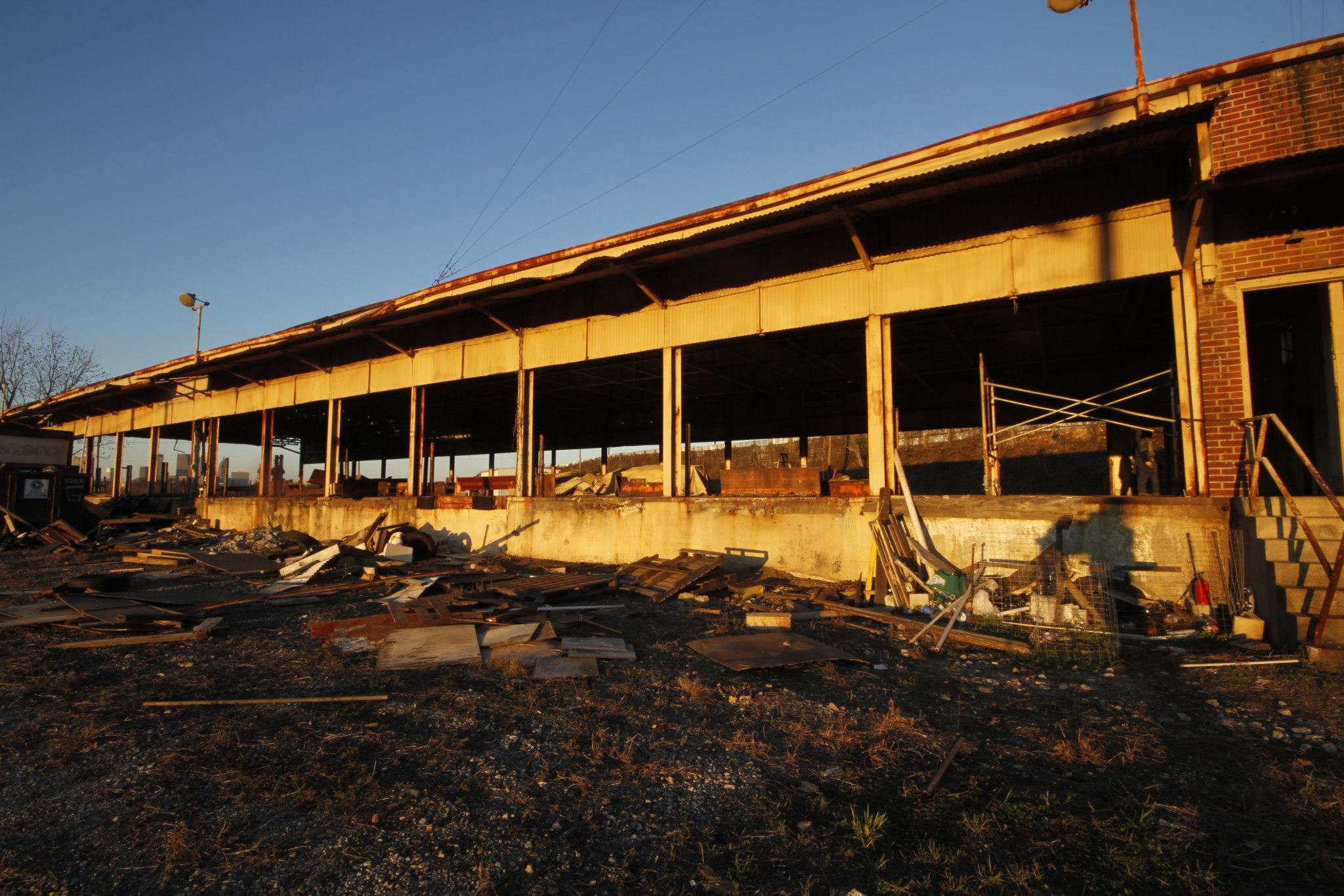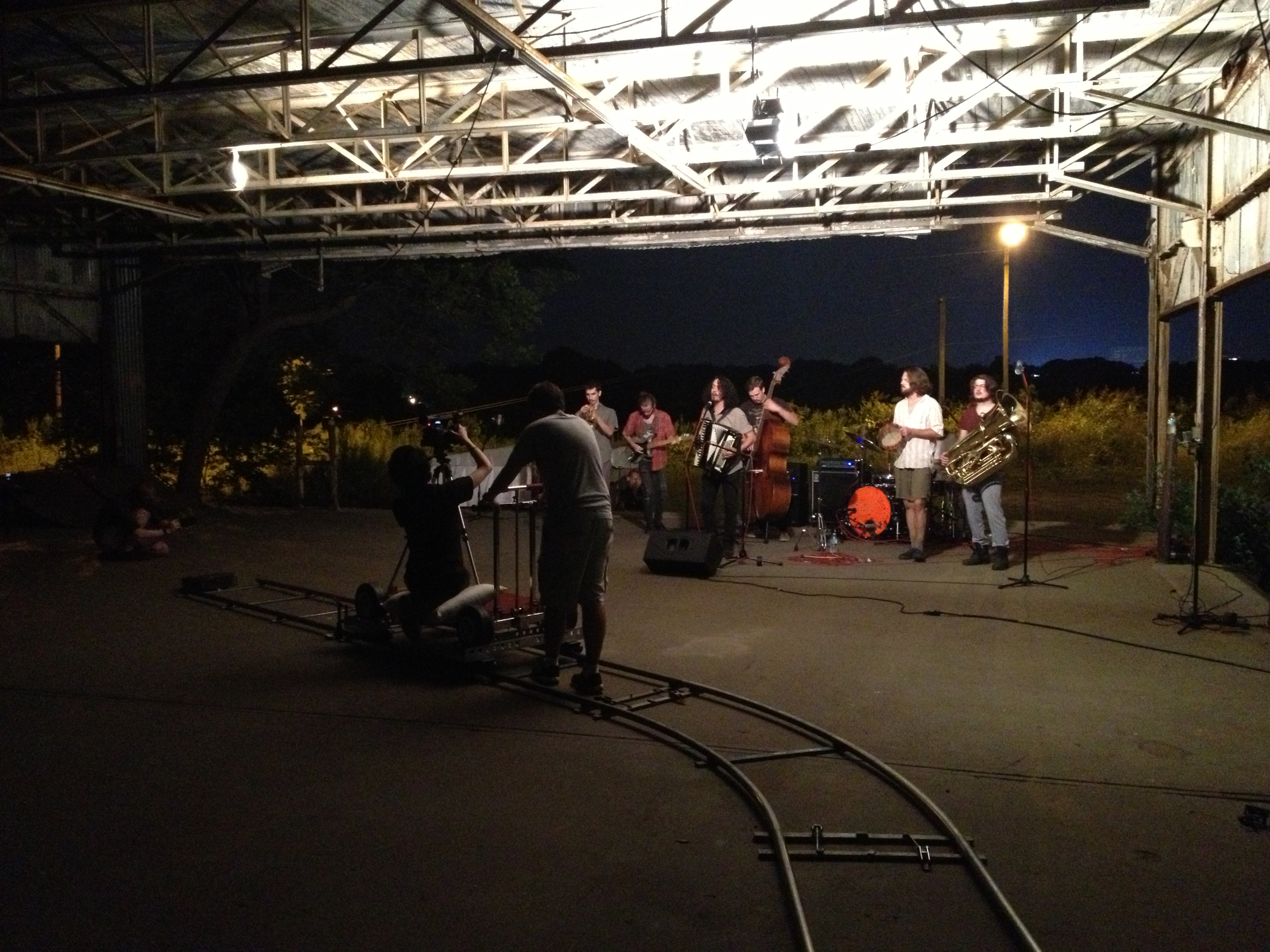Christ, Lord
Christ, Lord @ The Monarch Arts Center (Chosewood Park)
Christ, Lord @ Monarch Arts Center
"Calavera Catrina"
"Coal Rider"
The Space
Nestled quietly in the Chosewood Park neighborhood is the Monarch Arts Center, a complex of 1950’s offices, a communal area, a kitchen, and a large, open pavilion that provides a stunning view of the Atlanta skyline. The area is used by various community artists and musicians, providing studio and performance space.
The Band
by Dakin Andone
When you spend your time scouring through Facebooks, Bandcamps, and websites of local bands (especially those from Atlanta) you never expect to come across anything that even closely resembles an Eastern European gypsy-folk band. However, it doesn’t take long for that to happen in the ATL.
None of us should be strangers to the music of Atlanta natives, Christ, Lord. If you are:
1. What the hell have you been doing? and
2. I forgive you--seeing as you’re here--but let’s get some background.
It’s the brainchild of Christian Ballew and Brandon Camarda who, in 2009, started writing and playing underneath the name Christ, Lord as a recording project. The product was Magnalia Christi, a ten-track album that effortlessly transports you to the “old country” that your grandmother reminisces over during Thanksgiving, Christmas, and Easter dinners. The two amassed a band, comprised of musicians who they met through the Atlanta music scene. Ballew’s rich, clear voice coupled with the ensemble of accordion, trumpet, violin, guitar, and drums makes for a dark, classic sound that will have you hooked from the first listen.
A year and a half later, 11.11.11: a live session graced the internet and Atlanta, giving us another glimpse of just what these guys are capable of. The fast-paced, minor compositions vary enough to be interesting (they write waltzes for Christ’s sake. Get up and dance.) but are written in a similar enough fashion to stay true to the genre and to their vision.
Now, Christ, Lord is no stranger to indieATL. There’s been correspondence back and forth for quite some time, trying to arrange a time that we could work together. It finally happened and just in time for our second Spaces shoot. We met Christian and the guys at the Monarch Arts Center, south of downtown on Milton Ave. The crew was excited, the band was excited and you could feel it in the air. As our guys finished setting up audio and video, I had the opportunity to sit down with Christian and ask him a few questions, an opportunity that certainly wasn’t wasted.
indieATL: Your sound makes you stand apart from other local acts. Where did the inspiration come from and why, despite what other young, independent acts go for is it that you chose that sound?
Christian Ballew: I would say that most of it comes from my background. My grandmother listened to a lot of klezmer music, a lot of European music as well as folk music. So that sort of steeped me in an interest in classical folk music. She also taught me piano, so learning different pieces with her kind of sparked an interest. Honestly, it’s never something that was intentional, just sort of a manifestation of... my spirit, maybe?
iA: You said the word klezmer, and I notice that when I read about you guys there’ a lot of use of the word ‘klezmer,’ ‘gypsy,’ and ‘Eastern European,’ used to describe your sound. I think it’s interesting that music so classic and traditional in another culture is able to attract so much attention from the Atlanta music community. Was this something that you guys wanted to achieve from the outset, or did it just happen that way? Why do you think that the Atlanta music scene was so receptive to that?
CB(2): I would say it wasn’t an intention from the outset. Everyone wants to be well received, obviously, and you want to appeal to someone. I think that’s why people play music: they like to share. They have a need to express or connect with people. So certainly, that’s an influence. But I think the goal was, and is, to express musical ideas or songs that appeal to things that we like to hear and that maybe stand out a little bit in the homogenization of music. I think those styles of music have a lot of passion. And not only klezmer or Eastern European but African, Blues, folk music, roots music, anything like that because it comes from a tradition. It comes from experience, it has passion. That’s something we strive for. I think it’s well received because we enjoy what we’re doing and I think it’s fun for people because of that and because we like to celebrate, we like to dance, we like to play music, we like to sing. So, I hope that our shows encourage people and I certainly think the music encourages a lot of that. Once again, it’s about connection.
iA: You said the word “tradition.” Do you guys consider yourself a part of that gypsy or folk tradition? Or do you think you stand apart from that?
CB: I struggle with reappropriation of music and musical ideas and cultural ideas and art in general. I hope that I’m not a part of that in a negative way. I hope to, I guess you could say, reappropriate things but I’d like them to come from some original place like my American experience, which has a lot of international influence as well. I think there’s something genuine in it, but I don’t think that I can say that I’m a part of those cultures. I would love to have that depth of understanding, but I’m certainly an American boy.
iA: Christ, Lord has been around for about four years now. How has that time changed your perspective on the band and yourself, as a singer and a songwriter. How has the Atlanta music scene changed in those years for you?
CB: I’m gonna start with the music scene. I’ve seen the music scene flourish in many, many ways. I remember four years ago, playing at Wonderroot during open mics. And since then, many of the people who were playing at the open mics are now playing at The Earl. Wonderroot still is a viable source for the community’s arts, but it’s kind of risen above what it was for. I think that the scene has formed a lot of cohesion with different musical acts and venues and promoters. It seems to me that everyone is working really hard to bring good music to the city. We have a lot of amazing, beautiful, talented people here. Something that I feel like has changed or grown since we started trying to play, is friendship and love and support from different people that play music. That’s a unique thing. I don’t think it’s very common in most scenes. It’s also become a lot more experimental. As people grow up, they explore and I think that’s happening with everyone’s music and that’s an amazing thing.
As far as myself, or songwriting, I don’t particularly take myself very seriously. Or things, in general. So, when you’re labeled an “artist” or “musician,” or whatever those things are, you are forced to face that identity and you’re forced to decide whether or not you’ll take yourself seriously. In a way, it creates barriers with you, with your expression, I’d say. Or with your connection to the thing that you’re doing. It’s kind of like a trying ground and I think that if you can get past it, you can grow and become a more mature person. If you can’t, then you can still flourish and keep going, but there will be some sort of discontent there. I think everyone that does something creative is doing it, primarily, to fight that discontent.
iA: In June, Latest Disgrace premiered your video for “Frank Sinatra” and it seems to be further from your gypsy, folk style that you are known for. You achieve a very, I don’t know, Frank Sinatra-y sound in it, with a slower tempo relative to say, ‘Apple,’ and your rich vocals. You create a lot of harmonic tension between your voice and the music. It’s really jazzy and I really like it, so I was wondering where that came from and what the inspiration for that was. Is there a shift in the sound?
CB: The sound definitely changes. I’d like to think from song to song, but from day to day, definitely. We spend most of our time playing live. We try to write as much as we can. We try to practice as much as we can, but I’d say most of the time we spend with music is live and individual. That kind of changes the way the songs are forming. We’ll write a song and then play it out and it changes slowly, over time and becomes this new thing. Everything we’ve written--at least in the past full length album--was written almost as a studio project. Me and Brandon Camard, who sing and plays the trumpet and co-writes with me, we started it as a recording project. We’d work and fill in all the parts and sort of orchestrate them. Now it’s a process of a bunch of musicians getting together and forming that thing. I think the sound’s always going to change because we have those influences.
As far as that song in particular, I wanted to have something that was tender and open. I really enjoy Frank Sinatra. I think most people do. But that era of music is really profound to me and there’s so much romance and lushness and that’s something that I admire about life. I would say that something like ‘Apple’ is almost a rare expression of our sound at this moment. We were more rambunctious four years ago. I was a lot more hyper than I am now [laughs] and so everything is getting a little slower. It’s getting more meditative. It’s expanding more from just gypsy or klezmer, or writing in minor keys, to something a lot broader of a scale and hopefully bringing in influences from as many places as I can.









